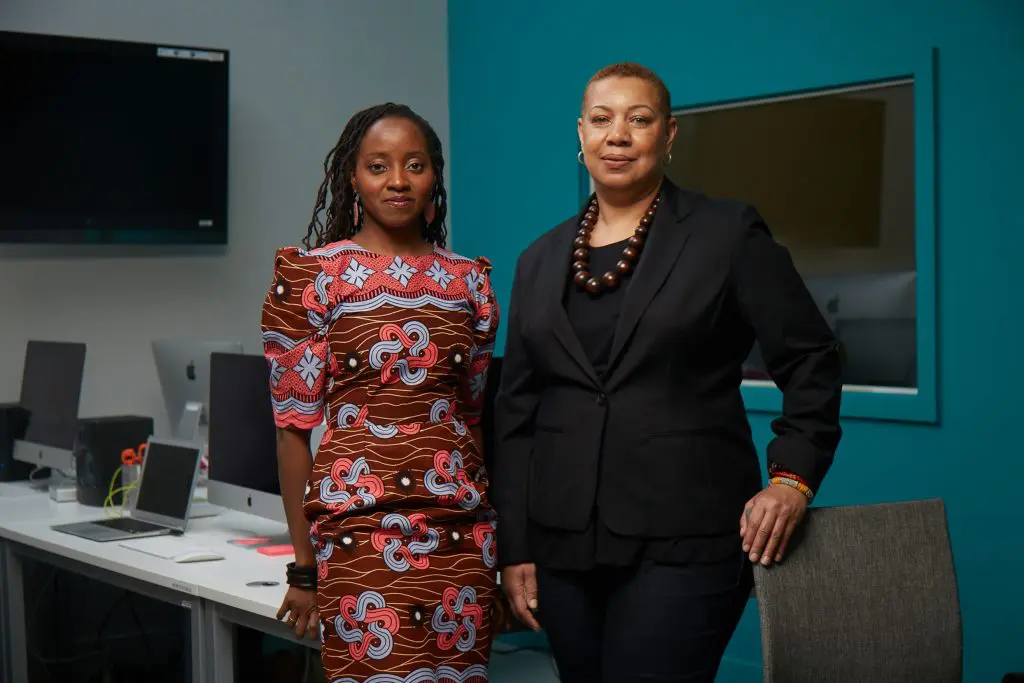Fifth Wave Profile Series: The Power of Two
Posted: Jun 19, 2020
Posted: Jun 19, 2020

Left to Right: Ngardy Conteh George and Alison Duke, founders of the Oya Media Group. Photo by Patrick Nichols
Powered by Liisbeth Media
Five thousand.
That’s roughly how many hours of film that Winston LaRose had in his personal archives when filmmaker Ngardy Conteh George met up with him to research a documentary she was making.
He had shot footage of Charles Roach, a Black civil rights lawyer who fought to change Canada’s citizenship requirements to allow people to swear an oath to the country instead of the Queen, which he argued represented a legacy of oppression, colonialism and racism. He had filmed Dudley Laws, a Canadian civil rights activist who became an outspoken critic of the Metropolitan Toronto Police after a number of Black Canadians were shot by police during the ‘70s and ‘80s. And he had also recorded Marlene Green, who called out racism in Toronto’s education system; and Roosevelt “Rosie” Douglas, a Black student leader who organized The Montreal Congress of Black Writers and led a national tour to build unity between Black and Indigenous Canadians – and was deported for his efforts.
He had archived footage of many more Black Canadian activists who had, as he told George, inspired him to become an activist and leader by their tenacity to represent Black people.
She wanted to use the footage in a documentary she was making on Black activists, but the more they talked, the more she realized that LaRose was a story onto himself: At 80 years old, he was running for a seat on city council to represent his neighbourhood, Jane and Finch, in the 2018 Toronto municipal election.
Located in the northwest end of Toronto, the multicultural, low-income neighbourhood has been home to successive waves of new immigrants but was now being squeezed by urban gentrification. LaRose had spent much of the past 25 years of his life helping residents of the community with issues such as housing and childcare as director of the Jane Finch Concerned Citizens Organization (JFCCO).
Recognizing how important LaRose and his campaign was to the community, George teamed up with her mentor, Alison Duke, and created
Mr. Jane and Finch, which ran on CBC Docs POV and was nominated for two Canadian Screen Awards: for Best Social/Political Documentary and Best Writing for a Documentary.
That was also one of the first productions for
Oya Media Group, the incorporated company George and Duke created after joining forces. For the two filmmakers, Mr. Jane and Finch is an example of the kind of impact they can make in bringing together their more than 40 years of combined experience in film and tv production.
Before George and Duke founded Oya in 2018, each had their own production company but felt they had “hit a ceiling” trying to work on their own, given the huge expenses involved in making films. Says George: “You’re solo running a company and you scale up and hire all the crew for different positions when things are busy and you have productions, but when it’s not, you have to scale back down to yourself.”
What they wanted to do, instead, was chase bigger projects and bigger budgets, and felt they had a better chance of success doing it together.
An upcoming project—a feature-length film called
Mothering in the Movement—is an example of that. Following the renowned poet, author and feminist Staceyann Chin, the midlife coming of age story looks at Chin’s relationship with her mother who abandoned her as a baby then again at the age of eight, the same age Chin’s daughter Zuri is in the film. It’s about reconciling her own labour pains of raising a child while working to create a world in which their lives not only matter but flourish.

Staceyann Chin and her daughter Zuri, from Mothering in the Movement.
Photo by Laurie Townshend, OYA Media Group.
For each project, Oya has to chase money from a number of sources. For
Mothering in the Movement,the filmmakers secured funding from the National Film Board and CBC. They have funded other projects through the Canadian Media Fund and Ontario Creates, and also work on commissioned projects for universities and arts organizations.
Given that funding is on a project basis, Oya’s team is composed primarily of freelance creatives and contract workers. They scale up, hiring production managers, line producers and other staff during production, and scale down between projects.
Still, George and Duke encourage input from everyone and strive for collaborative decision making, attributing Oya’s success to its nonhierarchical and decolonized structure. While everyone has their own role and responsibilities during production, George says that
“lots of things happen on consensus.”
As way to give back to their community, George and Duke created
Black Youth! Pathways to Industry Program (BYP2I), which helps Black youth gain experience in the digital media, film and television industry by providing mentoring and networking opportunities as well as on-site training. Duke’s brainchild, the BYP2I program is a three-year, industry-led initiative supported by the Ontario Ministry of Children and Social Services. Oya has hired on graduates as set photographers, production assistants and editors.
While working together has made things easier, George and Duke both say that being documentary filmmakers is far from easy. Layer on the added challenge of being women and Black working in an industry that is primarily male and white. Then there are the stories they want to tell about being Black in Canada. That’s not an easy sell to funding agencies. Says George: “We’ve had to explain why stories from the Black community in Canada are Canadian stories and why they’re relevant to the rest of Canada.” They get questions, such as, “Why would someone in a small town of Alberta care about the Black community in Toronto?” Yet funders would rarely ask a white filmmaker this: Why would someone in a large urban Black community in Toronto care about the white community in a small town?
Still, what brought the two together, and what keeps them together, is their drive to tell Black Canadian stories, so critical to the country’s history, though often forgotten. “Stories are important because history tends to repeat itself,” says Duke, “especially when we don’t acknowledge what has happened and we don’t try to make changes.”
The two filmmakers say the ongoing protests sparked by the killing of George Floyd has reaffirmed their belief in the work they’re doing.
Says Duke: “Sometimes when you’re an artist, you make work and you have to wait for society to catch up. Timing is everything, and so although there’s been a lot of heartache, hard work and sweat equity in our careers…we feel relieved at this moment because now it seems like we don’t have to do so much educating about the context. We’re seeing a shift. People are coming to us.”
Says George: “I feel like the world has finally caught up to what we’ve been standing on rooftops yelling for quite some time. It kind of feels like now they’re ready to listen.”
Fifth Wave, CFC Media Lab’s feminist business accelerator, has teamed up with media partner, LiisBeth — a womxn-led and owned intersectional feminist media enterprise — to showcase its program participants and their companies. Throughout 2020, Liisbeth will feature the women founders, and their businesses, who are participating in this progressive new CFC Media Lab initiative. Read Liisbeth’s monthly digital magazine for feminist entrepreneurs or check this page monthly to learn more about the inspirational women who are choosing to develop their companies by employing feminist business practices.
Fifth Wave is funded in part by the Government of Canada through the Federal Economic Development Agency for Southern Ontario.
Share this post: